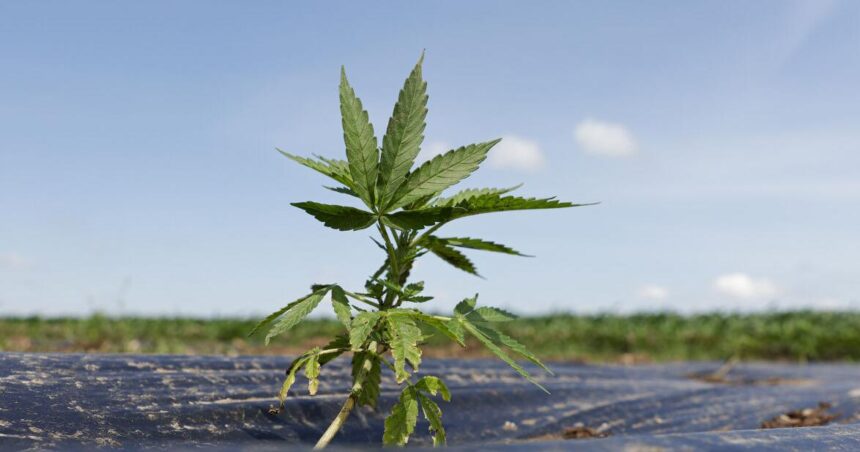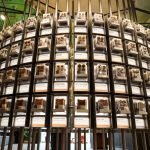When she was in her mid-30s, Sara Scott-Hitchings was bedeviled by migraines. After years of trying one medication after another, including opioids, Hitchings was running out of options. Marijuana was legal in California, and Hitchings’ neurologist in the Bay Area suggested she try it. Still, she was hesitant.
One day in 2019, as Hitchings endured the pounding in her head yet again, a friend handed her a vape pen. Hitchings took a drag, exhaled and it was as if a switch had been flipped.
“It got rid of the migraine instantly,” she said. “I was like, ‘what the (expletive) is this magic?’”
Hitchings, who is legally disabled as a result of her migraines, said she was able to get through the most painful times with the help of legal marijuana products. In California, these were easy to find. When Hitchings and her husband decided to move in 2021, they made a huge spreadsheet of potential destinations. Madison won, but there was an asterisk: a lack of legal weed options.
When the couple arrived in Wisconsin later that year, Hitchings was surprised to find shops offering legal cannabis products. Some products contained psychoactive cannabinoids — the scientific term for the chemicals that get a person high. Others included CBD, which doesn’t cause a buzz but has been shown to be beneficial for treating pain and other nervous system disorders.
How can a person in Wisconsin, a state where weed is outlawed, walk into a legal dispensary and buy an array of cannabis to smoke, eat and massage on the skin? Entrepreneurs, seizing on imprecise wording in hemp laws, have squeezed new products — some mind bending and some not — out of the complex cannabis flora, which comprises more than 400 chemicals.
What products are actually available here and how they compare to those purchased over the border in Michigan or Illinois is a winding story, with lots of ins and outs.
It starts with cannabis sativa itself.

Researcher Shelby Ellison walks through a row of recently transplanted hemp plants grown on a small plot at the UW-Madison agricultural research farm in Arlington.
Marijuana and hemp: Two definitions, one herb
When we think of the stuff that gets people high in weed, we’re conjuring in our minds the naturally occurring compound delta-9 THC, or Δ-9-tetrahydrocannabinol. This is the chemical that makes marijuana illegal in the U.S. Controlled Substances Act.
Currently, delta-9 THC is a Schedule I drug, which puts it in the same category of highly addictive drugs including opioids (heroin, oxycodone). The U.S. Justice Department recently moved to have marijuana downgraded to a much less dangerous category. If it were reclassified as a Schedule III drug, this would decriminalize cannabis while opening it up for more research and regulation.
Wisconsin hasn’t legalized delta-9 THC beyond minimal amounts allowed in federal law. Yet a customer can go to any of Madison’s hemp specialty stores, or to a grocery store, gas station, or other shop to readily purchase edible or smokable cannabis products. These Wisconsin dispensaries should not be confused with those that sell legal delta-9 THC products in other states.
This is possible because of the U.S. Farm Bill. Updated every five years or so, this federal legislation worth more than $400 billion is a massive umbrella bill, funding corn subsidies, conservation lands and food assistance programs.
In 2014, the Farm Bill split the cannabis plant into two categories. The first, “industrial hemp,” is any cannabis plant with 0.3% or less of delta-9 THC that can be made into “hundreds of products, including rope, paper, construction materials, carpeting, textiles, insulation, animal bedding and bioplastics,” according to the University of Wisconsin–Madison’s hemp crop profile page.
The second, “marihuana,” is the same exact plant, sometimes of the same breed depending on when it’s harvested, that measures more than 0.3% of the forbidden substance.
The Farm Bill in 2018 further established that those hemp plants — identical in size, shape and smell to marijuana — are considered legal for anyone with a license to grow and sell. It also expanded the definition of hemp to include anything that can be extracted from the plant, as long as it stays below the magic 0.3% threshold for delta-9 THC.
Phillip Scott is the owner of Crone Apothecary, a hemp dispensary on Madison’s north side. Ten years ago, he injured his back while driving a UPS truck, which is around the same time he heard about potential legalization of hemp products in the 2014 Farm Bill.
Scott met some growers operating under one of the first research licenses in Colorado, and decided to spend his time off there to get more information from those at the forefront of the business.
“I wanted to learn and become part of this community,” Scott said. “They opened the door and started teaching me and showing me a lot of things,” including how to grow, harvest and process hemp into cannabis products.
By 2017, Scott “heard rumors that there might be a new Farm Bill signed and the state might move forward on allowing (hemp) to be planted,” he said. He founded the Wisconsin Hemp Farmers and Manufacturers Association to advocate for local laws that would open up hemp production in the state.
Scott believed that crafting cannabis laws in a way that allowed for sale of any substance in the plant below the 0.3% threshold could allow for a road to legal weed, without the stigma. Wisconsin’s own hemp legislation, finalized in 2019, lined up the state with federal law, legalizing any cannabinoid not named delta-9 THC — and even delta-9 would still have wiggle room.
“My theory was ’let’s develop the products pushing the market,’” Scott said, “and if the state wants to try to come after me, we will sue them in the Wisconsin Supreme Court because we’re abiding by federal law.”
The market since then has grown. Nationally, the sales of hemp-derived products have gone from just over $200 million to $2.7 billion between 2020 and 2023, representing more than a thirteen-fold increase, according to a study published in Cannabis Business Times.
Statewide, cannabis farmers planted 870 acres of hemp in 2022, up from 680 acres of hemp in 2021. In 2018, Scott counted seven stores in the Madison area dedicated to selling hemp products. Now, he cites approximately 50 in Dane County.

Smoking THCA flower, which is in a legal “gray area” in Wisconsin, converts it into the kind of THC that produces a high.
CBD gets bigger
Tony Herman owns Dank of America (formerly Quality CBD) on Williamson Street. In 2018, he was searching for a local source of cannabidiol (CBD) for his parents, as he heard the substances in the cannabis plant could be helpful with ailments, including pain.
“My parents needed CBD oil, and I searched all over town,” he said. He eventually found some at Community Pharmacy for $300 a bottle. “It ended up working really well.”
Looking for a cheaper product, the next time Herman bought in bulk. “And I was like, OK, that’s a whole business,” he said.
Six years ago, Herman opened a retail store, art gallery and event space, now called Dank of America. At first he sold “broad spectrum” CBD products as gummy candies or in liquid form in a small bottle.
The store now sells an array of hemp-derived goods, including edibles and smokables, many procured from other states with marijuana restrictions similar to Wisconsin’s, including Oklahoma.
CBD and its sister cannabinoids — CBN, CBG and CBC — don’t contain psychoactive compounds; in other words, they don’t get you high. They do bind to receptors in the brain that link to a person’s central nervous system, which explains their effectiveness in treating nausea, loss of appetite, pain and other nervous system disorders.
Proprietors can’t specifically claim cannabinoids cure anything — they’re not doctors, after all — but they can make suggestions. Scott describes CBG, or cannabigerol, as an upper, “like caffeine without all the side effects.” CBN, or cannabinol, Scott believes is “better than melatonin” to promote relaxation. Both are less popular than CBD but are gaining interest and becoming more available.
These types of therapies have shown promise in cancer treatment, with most research focusing on its use for physical symptoms like pain, lack of appetite, nausea and vomiting. That’s according to Apoorva Reddy, a postdoctoral research fellow in the department of surgery at UW–Madison who studies the effectiveness of these treatments.
“Considering that we have FDA-approved use of cannabinoids for observable physical symptoms,” Reddy wrote in an email, “it is important to determine the additional, possibly significant effects of cannabinoids on anxiety, depression and disturbed sleep.
Herman at Dank of America had heard about “full spectrum” products containing not just the cocktail of helpful non-psychoactive cannabinoids, but delta-9 THC as well. From there, Herman started selling full spectrum tinctures and delta-9 THC beverages. He also sells hemp products to be smoked — the legal ones — and edibles within the legal limit.
Anything labeled “full spectrum” can produce a high, even in a small container. Because it takes so little THC by weight to produce an effect (Weedmaps, a tech company serving the cannabis industry, says a starter dose is 2-5 milligrams), producers can pack a lot of THC into a liquid, since there are 1,000 milligrams of mass in one milliliter of water — adding a little bit of THC doesn’t change the calculation all that much.
The same goes for delta-9 edibles, which are now available in stores across Madison. Crone Apothecary’s Phillip Scott, who makes his own tinctures, explains that it’s just a matter of “playing with the volume” to keep THC levels below that 0.3% threshold.
This mass-to-volume dilution trick is also why patrons of cafes, supermarkets and bars across the city can legally purchase a delta-9 THC beverage like Honeybee Cannabis’ line of 4.20 milligram drinks. Like other psychoactive hemp products, there are no legal restrictions on who can buy it, but Honeybee’s sodas say “21+” on them. Many Madison-area cannabis stores say they check IDs for psychoactive products like this one.
Some hemp beverages and solutions are pushing the boundaries of what can be done within Wisconsin’s framework. At the high end of dosage is Kind Oasis Fast Acting Syrup, made in Milwaukee and available at Turning Leaf Madison East.
Per the label, each bottle of syrup contains a whopping 420 mg of delta-9 THC, sold in strawberry, watermelon, pink lemonade and mango.
Every hemp product sold in Wisconsin must have a Certificate of Analysis, an official document required by the USDA that demonstrates the item has been tested for the legal limit. That includes this syrup, for which the serving size, according to the product label, is a half tablespoon that contains 20 mg of delta-9 THC. A small amount packs a pretty big punch, sold in a bottle the size of cough syrup.

Phillip Scott, owner of Crone Apothecary, pours bulk amounts of cannabis flower into a bowl at his store in Madison.
Digging into delta
When most people think of pot, it’s probably the sticky, stinky, dense cannabis flower that gets rolled into a joint or packed into a bowl for smoking. To produce a high from a legal flower in Wisconsin, producers have turned to THCA.
THCA — the “A” stands for acid — is similar to delta-9 THC. The flowers look, feel and smell just like the illegal-in-Wisconsin flower. Flowers rich in THCA alone can’t get a person high, but when they’re lit on fire, the THCA transforms into delta-9 THC.
Shelby Ellison is an assistant professor of plant and ecosystem sciences at UW–Madison.
“A cannabis plant in the field is making CBDA and THCA,” Ellison said. “Only through a chemical process that normally happens when heated do you convert THCA into delta-9.”
That means that by the time the smoke hits your lungs, the THCA in the plant has been converted into the THC that very much produces a high. THCA is supposed to be counted in the calculation of marijuana versus hemp with its 0.3% threshold, but it’s in a legal gray area.
At Crone Apothecary, Scott grows his own THCA-rich flower under the brand Badger Hemp Corridor. The certificates of analysis he is required to produce for federal agencies show THCA quantities, but those agencies aren’t currently accounting for it, according to Scott. What they are doing, he said, is telling growers to cut it out for the next harvest as early as this September, when the 2018 Farm Bill expires.
The Drug Enforcement Administration’s chief of drug and chemical evaluation, Terrence Boos, recently wrote in a letter that accurate testing of THCA should be taken into account when marijuana and hemp are differentiated, so the substance’s legal days might indeed be numbered.
Scott says the DEA is suggesting businesses stop selling THCA but hasn’t gone so far as to crack down. He continues to sell it at his store and at farmers markets in the Madison area.
Delta-8 THC, found in small quantities naturally in hemp plants, has a slightly different shape than delta-9 THC. Often found in edibles or vape cartridges, delta-8 produces a similar high to delta-9, but with less potency.

Phillip Scott holds hemp derived gummies, which are sold at his store in Madison.
In studies conducted at the University at Buffalo, participants found the effects of delta-8 products to be about half as intense, with the most common experiences being relaxation, euphoria and pain relief.
Jessica Kruger, associate clinical professor of community health and health behavior at the University at Buffalo, researches the effects of marijuana on wellbeing and was the lead author on the research.
In a statement to the Cap Times, Kruger noted that study participants actually preferred delta-8 products to their delta-9 counterparts, in part because the chemical is less potent, thus producing fewer feelings of paranoia and anxiousness. If someone wanted to feel a similar high to delta-9 products, Kruger estimated that users could simply double the dose of delta-8, while cautioning the need for further studies.
“That won’t happen until the scheduling of cannabis is changed at the federal level,” Kruger said. “Ultimately a lot of the claims out there about what different types of cannabinoids do is pushed by different brands, versus actual research,” Kruger said. Scientists have to rely on people who self-report their experiences, which is problematic.
“There is a lot to still learn,” she said. “There can be issues with recall, and if the person using the substance knows what they are using.”
Meanwhile, the FDA and the state of Wisconsin now consider delta-8 THC to be an unregulated, legal psychoactive substance without enough information on safety. To accurately compare delta-8 with delta-9, Kruger wants to see randomized, double-blind clinical trials.
One concern about delta-8 is in the processing. Since there are currently no known varieties of the hemp plant that have enough delta-8 THC to get a person high, it’s made synthetically from other parts of the plant.
Herman, at Dank of America, said if delta-8 THC were naturally extracted, “it’d be one of the most expensive cannabinoids in the market.”
But that process of synthesis adds solvents such as heptane, a substance that’s in the gasoline available at the pump. Because there’s no regulatory process in place to ensure that the end product is safe to ingest, Herman is concerned about a customer putting something in their body that might not be safe, noting that tests for pesticides and heavy metals aren’t required in this market.
“I want only a naturally sourced delta-9 product,” he added. “I don’t want something that was converted in the lab with a bunch of chemicals.”

Dank of America is located at 1222 Williamson St. in Madison.
What’s next for Wisconsin cannabis
With delta-8 THC, THCA and other cannabinoid products readily available in Madison, national and local lawmakers have taken notice. An amendment recently added to the 2024 Farm Bill calls for the ban of any hemp products that contain psychoactive substances. Recently, Wisconsin Assembly Speaker Robin Vos signaled to the Milwaukee Journal Sentinel that he’d like to see Wisconsin do the same.
State Sen. Melissa Agard, a long-time proponent of legal marijuana, recently advocated in an opinion column for the Cap Times for legalization with regulations to keep these products safe.
“Rather than a ban, we ought to fully legalize cannabis for responsible, adult use and lay out a regulatory framework for producers and businesses who make and sell cannabis products,” she wrote.
The hemp store owners in Madison tend to agree. Scott said he knows “government doesn’t fix all your problems,” but “we’d need more regulation on how to operate, who we can sell this product to.”
“We can stay a thriving business and keep paying taxes to the community,” Scott added. “That would be my ultimate goal. Making sure we keep every business in this space accountable, to make sure we’re all providing a quality product. That’s the toughest part.”
Kattia Jiménez, owner of Pura Vida Organic Farm in Mount Horeb, sells non-psychoactive CBD products she produces herself. Jiménez wants to see more rules about labeling come from the federal government.
“There was all the excitement in 2018 … where a lot of people entered the industry in Wisconsin,” she said, estimating a peak of license applications in 2019. “We are really looking for clarity and leadership from the FDA, which is waiting to have more data, more information to classify CBD products as nutritional supplements.
“That’s what a lot of us in the industry would like to see. And that hasn’t happened,” she said. “When you have big beverage companies or food companies not willing to jump into hemp because there’s not this regulatory infrastructure, it has really hurt the industry.”
Whether change comes from the federal government or locally, UW-Madison’s Ellison is ready to assist Wisconsin’s hemp farmers. She helped form the Midwestern Hemp Database, a comprehensive list of cannabis strains and what’s in them.
There’s even Badger G, a genetically modified hemp variety developed by a team at UW-Madison’s Wisconsin’s Crop Innovation Center that contains no THC at all. This could be grown by farmers who don’t want to sweat the legal limits and are growing for the fiber or non-psychoactive cannabinoids.
“I think it’s a good region to grow cannabis,” Ellison said. “Hemp is really interesting because it’s so much behind other crops. There’s been such limited breeding, especially in the United States (in) the last century.”
Ellison is a plant scientist who used to work with carrots, when “life was easy.”
“Now everything is very, very complicated,” she said. “I have to have a research license, I have to record all of my sites. I have to have a background check to grow cannabis for the university. There’s just tons of paperwork and you always feel like you’re kind of doing something illegal, even though you’re doing everything you can to be legal.”

Rolled cannabis is sold in individual files at Dank of America on Williamson Street.
Lucas Richert, a history of pharmacy professor at UW-Madison, studies the developing markets in hemp and marijuana products and the gray areas of regulation.
“The optimal outcome is that consumers have the ability to make well-informed choices in the marketplace,” Richert said. “And that those choices are accompanied by a system of regulation that provides a reasonable assurance of safety.”
“Wisconsin legislators have got their work cut out for them,” Richert added. “They need to grapple with the complexities of federal reclassification of cannabis. They also need to reckon with what an appropriate medical cannabis program might look like in the state. Then they need to figure out what to do with hemp-derived products as governed by the Farm Bill.”
Richert said an “ideal outcome” would be greater clarity about the legality of hemp-derived products at both the federal and state levels.
“It’s clear we are all operating within a gray zone of legality when it comes to hemp products and that the market has moved faster than the political and regulatory systems,” Richert said. “The hemp industry is a nearly $30 billion industry in the U.S. and it isn’t going away anytime soon.”
For now, it’s up to customers to do their best with the information they have.
“Everybody’s body is different,” Scott said. He encourages people to try CBD and THCA products when they’re done with work. “Don’t put yourself in a bad situation when you’re first trying a new product. (Try it) during the evening, during the afternoon when you don’t have to go do anything. That way, if it puts you to sleep, you’re not driving.”
He encourages anyone who’s concerned about his products to talk to their doctor.
In the meantime, Hitchings, the migraine sufferer, is actively looking to trace the origins of the products she uses.
“In any other cannabis community, that’s the knowledge you have,” she said. “Who grew it … you know how good it is.”
But she’s keeping her options open. She wants easy access to what she considers a life-saving drug.
“My migraines and my PTSD nightmares are unlivable otherwise,” Hitchings said. “I would just move if it became less available to me here. Yeah, we would just move to another state.”











